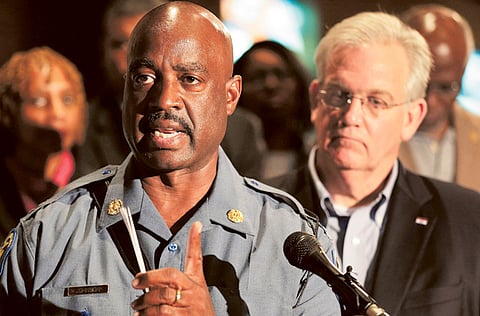Ferguson protests captain: 'We handled it just right'
Captain Ron Johnson seemed to pulled Ferguson back from the brink

Ferguson, Missouri: He was the man who seemed to have pulled Ferguson back from the edge.
After nights of unrest, during which police fired tear gas and rubber bullets at protesters who hurled abuse, rocks and occasionally worse, captain Ron Johnson signalled that things had changed by leading a peaceful march of demonstrators through the centre of the town on Thursday.
“We’re going to have the approach that we’re in this together,” the state highway patrolman had told reporters in his deep baritone a couple of hours earlier, after being handed control of the protests over the killing of Michael Brown, an unarmed 18-year-old, by a police officer.
Johnson won early plaudits for his hands-off strategy, and his easy manner with people who had taken to the streets persuaded many that he felt their pain. He allowed a carnival-like demonstration to swell later on Thursday on the spot where earlier clashes had raged.
“I think we handled it just right,” he said the next morning, pledging to repeat the tactics that night.
But the euphoria faded fast. Late on Friday, pockets of rioting brought back the armoured trucks, riot gear and tear gas. Later still, after police retreated, small crowds began looting shops, most notably one where Brown allegedly shoplifted cigars before he died.
Governor Jay Nixon finally had enough. On Saturday afternoon, the embattled Democrat declared a state of emergency and a curfew from midnight to 5am, effective immediately, in this northern suburb of St Louis that is home to about 21,000 people.
“We can’t have looting and crimes at night,” he said. “We can’t have people fearful.”
After all the heady acclaim, Johnson abruptly found himself forced to abandon his policy of giving demonstrators the “chance to express what they are feeling”. From Saturday night, he had to enforce an order for them to stay in their homes.
Johnson’s appointment seemed a savvy one. Announcing his role on Thursday afternoon, having wrested control of the protests for his state troopers from St Louis County, Nixon stressed that the trooper, who is 51, “grew up in this area”. The contrast with the outsiders who had led the earlier crackdown was clear.
Nixon and Thomas Jackson, the city’s police chief, have seemed distant and unsteady in public appearances since the shooting. By contrast Johnson speaks with a statesmanlike authority and empathy uncommon in a regional transport police chief whose job more typically involves urging the state’s drivers to stop texting at the wheel.
Hours before his appointment, he visited a local high school to reassure rattled students the violence would stop. One girl was crying, he said.
‘Make a difference’
“And I can tell you that I almost had tears in my eyes,” he told reporters, as tears welled in his eyes. “But I told her we’re going to make a change, we’re going to make a difference.”
He gave the students his address, and told them to write him a letter about how the crisis had affected them. “And when this is over, I am going to read that to the troopers,” he said.
Unlike Jackson and 94 per cent of his officers, as well as Nixon and St Louis County chief Jon Belmar, who are all white, Johnson, like most of the young demonstrators, is African American. Asked on Thursday night how he was managing to get his message through, he said, “I know a lot of them” and “we have to be reflective of our community.”
After marching with them, he told protesters to hearty applause they could stay as long they wanted if they kept traffic moving.
A 27-year veteran of the state highway patrol, Johnson leads almost 150 officers in troop C, which covers eastern Missouri. He began his career in the same troop, won promotions, then left in 1999 for a job near Kansas City. But, as he told reporters earlier this week: “I called my wife one day and said you know what? We need to go back home, go back to our family and friends.”
He was promoted to captain and returned to where he began his career.
But for all the emphasis on Johnson’s local roots, he has graduated to a position of authority and an affluent lifestyle from which most young men in Ferguson are far removed.



